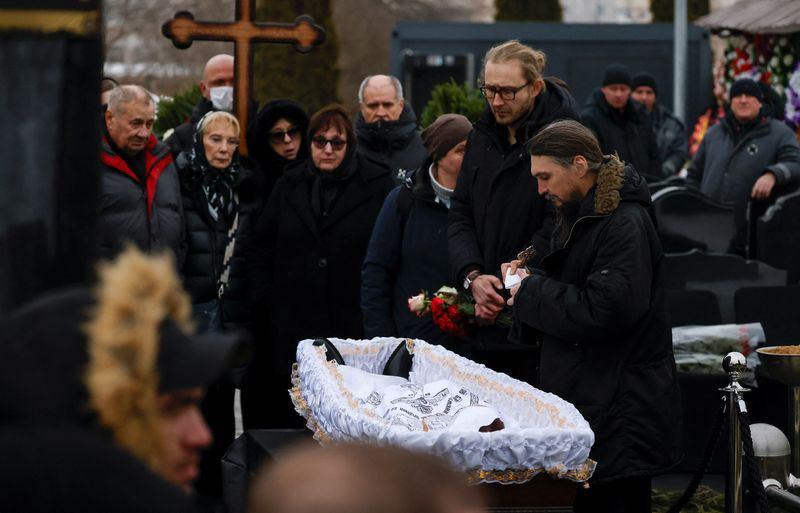MOSCOW, (Reuters) – Thousands of Russians chanted Alexei Navalny’s name and said they would not forgive the authorities for his death as the opposition leader was laid to rest in Moscow on Friday.
At a cemetery not far from where Navalny once lived, his mother Lyudmila and father Anatoly stooped over his open coffin to kiss him for the last time as a small group of musicians played.
Crossing themselves, mourners stepped forward to caress his face before a priest gently placed a white shroud over him and the coffin was closed.
Navalny, President Vladimir Putin’s fiercest critic inside Russia, died at the age of 47 in an Arctic penal colony on Feb. 16., sparking accusations from his supporters that he had been murdered. The Kremlin has denied any state involvement in his death.
The authorities have outlawed his movement as extremist and cast his supporters as U.S.-backed troublemakers out to foment revolution. Kremlin spokesman Dmitry Peskov said he had nothing to say to Navalny’s family.
Many thousands of people turned out to pay their respects at the cemetery and earlier outside the Soothe My Sorrows church in southeast Moscow where the funeral took place.
Among the large crowd, many people clutched bunches of flowers and some joined in a series of chants – “Russia will be free”, “No to war”, “Russia without Putin”, “We won’t forgive” and “Putin is a murderer”.
Police were present in large numbers but for the most part did not intervene. A rights group, OVD-Info, reported six people had been detained in Moscow and at least 39 in other parts of Russia.
“There are more than 10,000 people here, and no one is afraid,” said a young woman, Kamila, in the crowd. “We came here in order to honour the memory of a man who also wasn’t afraid, who wasn’t afraid of anything.”
Kirill, 25, said: “It’s very sad for the future of Russia… We won’t give up, we will believe in something better.”
Public demonstrations in Russia are risky and rare, especially since the start of the war in Ukraine that the Kremlin calls a “special military operation”. More than 20,000 people have been detained in the past two years.
Despite Friday’s high turnout and flashes of defiance, Navalny’s death leaves Russia’s fragmented opposition in an even more precarious position as Putin prepares to extend his 24-year rule by another six years in an election this month. All of the president’s leading critics are behind bars or have fled the country.
Even from prison, Navalny had cheered his supporters with displays of resilience and humour in his frequent legal hearings and social media posts. His death leaves many feeling bereft.
“I want to do what Navalny told us to and not give up but I don’t know what to do right now,” said one young man in the crowd.
On a memorial website, more than 140,000 people lit “virtual candles” for Navalny. It was unclear how many of those were inside Russia.
MOTHER’S STRUGGLE
Navalny’s mother Lyudmila, 69, had travelled to the “Polar Wolf” penal colony after his death and battled with authorities for a week to get them to release his body. She accused them of putting pressure on her to bury him without a public funeral, something the Kremlin denied.
The service was brief, and took place in a church whose worshippers had raised funds to buy drones and other equipment to support Russian soldiers in the Ukraine war that Navalny condemned as an act of madness by Putin.
Inside, Lyudmila was pictured seated and holding a candle as priests in white robes stood over her son’s coffin.
“This is a photograph that is very hard to look at,” said Ruslan Shaveddinov, co-host of a livestreamed event by Navalny aides now based outside Russia, who struggled to contain their emotions as the pictures and footage rolled in.
State media gave scant coverage to the funeral. The RIA news agency reported the fact of Navalny’s burial, noting the presence of foreign envoys including the U.S., French and German ambassadors, and recalled that he had been jailed on a host of charges including fraud, contempt of court and extremism.
Navalny denied all those charges, saying they had been trumped up by the authorities to silence his criticism of Putin.
More than a quarter of a million people watched the farewell to Navalny on his YouTube channel, which is blocked inside Russia. Messages, mostly expressing sadness but some also defiance, streamed down beside the video.
Allies of Navalny outside Russia have called on people who want to honour his memory but could not attend his funeral service to instead go to memorials to Soviet-era repression in their own towns on Friday evening at 7 p.m. local time.
The Kremlin said any unsanctioned gatherings in support of Navalny would violate the law and those who took part would be held accountable.
Navalny’s wife Yulia and two children, who are living outside Russia, did not attend the funeral.
Yulia Navalnaya, who has pledged to continue her husband’s work, thanked him for “26 years of absolute happiness”.
She posted on X: “I don’t know how to live without you, but I will try my best to make you up there happy for me and proud of me. I don’t know if I’ll manage it or not, but I will try.”
Navalny, a former lawyer, mounted the most determined political challenge against Putin since the Russian leader came to power at the end of 1999, organising street protests and publishing high-profile investigations into the alleged corruption of some in the ruling elite.
Navalny decided to return to Russia from Germany in 2021 after being treated for what Western doctors said was poisoning with a nerve agent only to be immediately taken into custody.
Putin has yet to comment on Navalny’s death and has for years avoided mentioning him by name.

